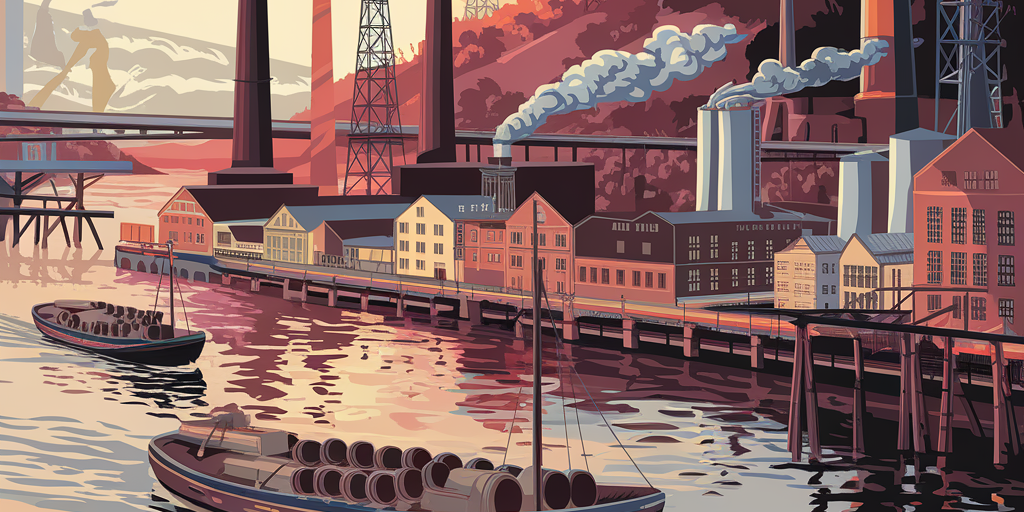Introduction: The Forgotten Oil Capital
When people think of oil booms, Texas or the Middle East might come to mind. But few realize that Western Pennsylvania — and Pittsburgh specifically — was ground zero for America’s first oil rush. In the mid-19th century, Pittsburgh’s industrial base, river access, and technological prowess turned it into the refining, transportation, and financial center of a budding oil empire.
This is the story of how Pittsburgh helped ignite the American oil industry, fueling economic growth, powering new industries, and setting the stage for the energy giants of the 20th century.
The Birthplace of the American Oil Industry: Titusville and Beyond
The oil story begins north of Pittsburgh in Titusville, Pennsylvania, where Edwin Drake drilled the first successful oil well in 1859. Known as “Drake’s Well,” this event triggered the first oil boom in U.S. history.
Suddenly, the forests of Western Pennsylvania were full of derricks and wildcatters, pulling crude oil from the ground in staggering amounts. But getting that oil to market — and turning it into usable products — required industry, capital, and refining power.
That’s where Pittsburgh stepped in.
Why Pittsburgh Became the Oil Boom’s Industrial Hub
Several factors made Pittsburgh the perfect center for the growing oil industry:
1. River and Rail Connections:
- Pittsburgh’s rivers — especially the Allegheny and Ohio — became crucial for shipping oil.
- Railroads quickly connected oil regions to Pittsburgh’s industrial centers.
2. Existing Industrial Base:
- Pittsburgh already had ironworks, glass factories, and machine shops ready to serve oil needs.
- It became a center for building refinery equipment, pipelines, barrels, and drilling tools.
3. Skilled Labor and Capital:
- Pittsburgh’s wealth from coal and steel attracted speculators, bankers, and entrepreneurs ready to invest.
The Rise of Pittsburgh’s Refineries and Oil Tycoons
By the 1860s and 1870s, Pittsburgh was refining much of Pennsylvania’s oil. Refineries sprang up along the rivers, turning crude into kerosene, lubricants, and other valuable products.
Key Players:
- Charles Pratt and Henry Rogers: Pittsburgh oil refiners who later joined forces with Rockefeller.
- Standard Oil’s early footprint: While John D. Rockefeller was based in Cleveland, many of his early partners and suppliers operated in and around Pittsburgh.
Kerosene produced in Pittsburgh lit lamps across the country and overseas, making the city a global energy hub.
Technological Innovations and the Birth of Pipelines
Early oil transport relied on barrels, wagons, and riverboats — expensive and dangerous.
Pittsburgh innovators helped pioneer pipeline technology, changing the game:
- Pipelines reduced spills, theft, and transportation costs.
- Pittsburgh companies manufactured pipeline materials, pumps, and valves.
This innovation helped oil become America’s first truly mass-distributed energy commodity.
Pittsburgh’s Chemical and Industrial Spinoffs
The oil boom didn’t just make kerosene — it spurred entire new industries:
- Chemical production: Pittsburgh factories created solvents, lubricants, and early plastics.
- Glass industry: Grew rapidly thanks to oil-fueled furnaces and demand for containers.
- Steel mills: Supplied the infrastructure for derricks, pipelines, and refineries.
Oil profits also flowed back into Pittsburgh, funding banks, universities, and civic projects.
The Decline of the Regional Oil Boom, But Not Pittsburgh’s Energy Legacy
By the early 20th century, oil production moved west to Ohio, Texas, and beyond. Yet Pittsburgh’s role as an energy hub didn’t end:
- It evolved into a center for coal, natural gas, and electricity.
- Many petrochemical companies trace their roots to Pittsburgh’s oil boom era.
- The city’s industrial expertise shaped future energy innovations.
Conclusion: The City That Helped Fuel America’s Oil Age
Pittsburgh’s role in the 19th-century oil boom is often overshadowed by its steel legacy — but it was just as important in shaping the nation. The city’s refineries, riverboats, and industrial might helped turn crude oil into a global commodity, lighting homes and powering machines.
Today, Pittsburgh’s influence can still be traced in the energy industry — a testament to its early role as the unsung heart of America’s first oil rush.









